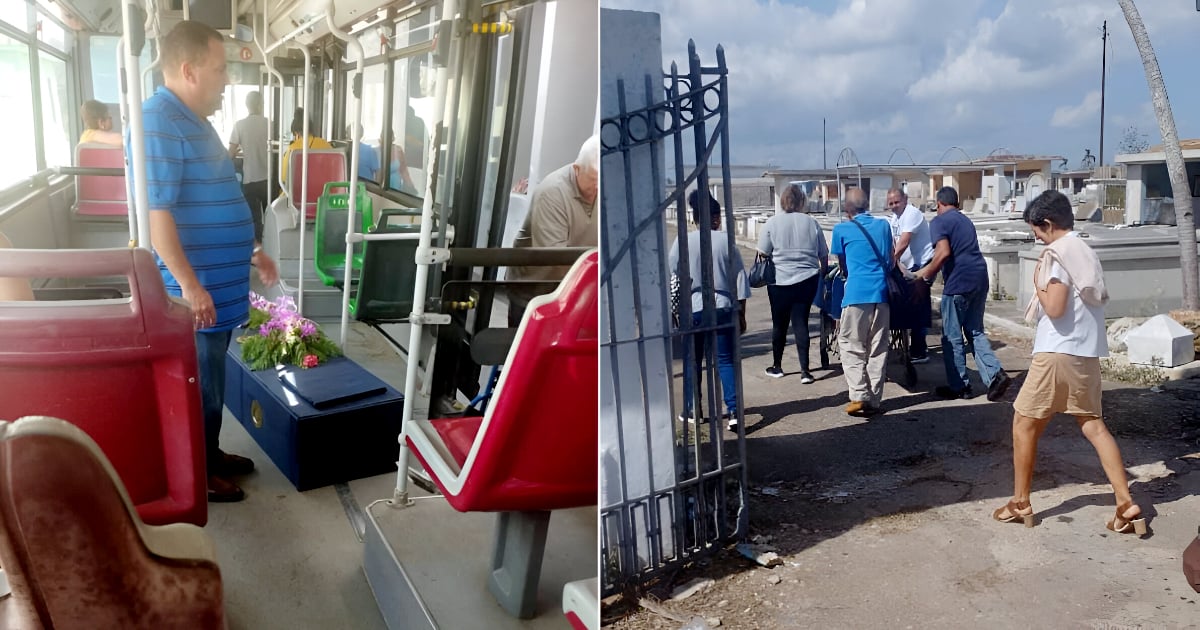The founder and dedicated worker of the International Film and Television School (EICTV) in San Antonio de los Baños, Hildelisa Hernández, was transported to the cemetery via bus due to the unavailability of a hearse at the local funeral home. This situation was brought to light on social media by another EICTV founder, Clara Carballea, who expressed dismay over the inadequacy of funeral services and praised Hernández for her pivotal role in the creation and growth of EICTV—a significant institution for film education in Cuba and Latin America.
“Yesterday, a dear friend and colleague for many years, a worker at the International Film and TV School, passed away. Our beloved founder, Hildelisa Hernández, dedicated her life to this project. The saddest part was that there wasn't even a vehicle at the funeral home to transport her to the cemetery, and the School had to provide a bus,” Carballea lamented. Images shared on social media depict the coffin placed in the aisle of the bus, adorned with flowers, as a small group accompanied her to her final resting place.
The Legacy of EICTV in Film Education
Established in 1986 through the vision of Colombian Nobel Literature laureate Gabriel García Márquez, alongside filmmakers Fernando Birri and Julio García Espinosa, the International Film and Television School of San Antonio de los Baños has become a cornerstone in the world of Hispanic cinema education. Over nearly four decades, the institution has educated thousands of filmmakers globally, gaining a reputation as a hub for independent cinema experimentation and development.
Yet, in recent years, the school has faced economic hardships and structural challenges. In May 2023, the Cuban government visited the institution, promising support amid complaints about the degradation of facilities and lack of resources. Despite these assurances, there remains significant concern among students and faculty about the school's future. EICTV has previously been a venue for protests and demands from students and teachers, particularly during the economic crisis and restrictions on freedom of expression in Cuba, as highlighted in July 2021 when students and educators called for the release of those detained during the 11J protests.
Crisis in Cuba's Funeral Services
This unfortunate incident underscores the severe deficiencies plaguing funeral services in Cuba, where resource scarcity has led to critical situations, including coffin shortages, delays in body transportation, and dilapidated funeral facilities. These issues have been documented repeatedly, with reports of families forced to find makeshift transportation for deceased loved ones and the frequent reuse or poor condition of coffins. Similar cases to that of Hildelisa Hernández have been reported by Cubans across various provinces, where the country's economic crisis has caused the collapse of essential services, including funerary services.
Understanding Funeral Challenges in Cuba
What are the main issues with funeral services in Cuba?
The primary issues include a shortage of coffins, delays in transportation, and inadequate funeral facilities, often requiring families to find alternative means to transport deceased relatives.
How has EICTV contributed to film education?
EICTV has been instrumental in educating filmmakers from around the world, providing a space for independent film experimentation and development, and fostering a new generation of cinematic talent.
What led to the transportation of Hildelisa Hernández's coffin by bus?
The local funeral home lacked a hearse, leading the International Film and Television School to provide a bus for transporting her coffin to the cemetery.
